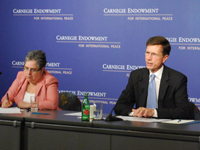Registration
You will receive an email confirming your registration.
The turbulent recent events in Kyrgyzstan have emphasized the importance of pursuing a focused and multi-faceted policy in the country. Ambassador Robert O. Blake, U.S. Assistant Secretary for South and Central Asian Affairs, presented an overview of the current U.S. policy towards Kyrgyzstan and Central Asia in a talk at the Carnegie Endowment for International Peace.
U.S. Priorities in the Region
Stressing Central Asia’s importance to the United States, Blake outlined five priorities for U.S. policy in the region:
- Expanding cooperation with Central Asian states to assist coalition efforts in Afghanistan;
- Increasing the development and diversification of the region’s energy resources;
- Promoting political liberalization and respect for human rights;
- Fostering competitive market economies; and
- Preventing the emergence of failed states.
With these goals in mind, the United States has established annual bilateral consultations with countries in the region. These consultations have expanded to include business components, as a response to the interests of the American business community, Blake explained.
Kyrgyzstan
The U.S. government is focused on five key areas that are crucial to charting a stable and democratic future for Kyrgyzstan, Blake stated:
- Boosting security: Establishing an Organization for Security and Co-operation in Europe (OSCE) Police Advisory Group will boost security forces in the south and prevent further violence. This initiative faces some resistance in the country, and the OSCE counts on the support of the provisional government to facilitate a smooth deployment of the Group in the next month.
- Building trust: Encouraging local law enforcement and judicial institutions to act as reliable and credible community partners will build trust with the people.
- Investigating causes of violence: Encouraging domestic and international investigations into the causes of the violence in June is important for preventing further outbreaks of violence and ensuring accountability for those responsible.
- Facilitating reconstruction: The United States is dedicated to helping reconstruct the homes and lives of the victims of the June violence, providing humanitarian assistance, and taking steps to bring the conflicting sides together by finding people—such as religious leaders—who can serve as bridges between the communities.
- Helping to establish a functioning democracy.
Regarding U.S. policy in Kyrgyzstan going forward, Blake emphasized the importance of international consultation and cooperation. The United States, Kazakhstan, Russia, and other countries should continue working with the UN and EU to support President Otunbayeva, while remaining aware of the delicacy required in reconciliation and of the possibility for new violence, he said.
Blake commended Uzbekistan for acting quickly to receive refugees from Kyrgyzstan, but pointed out that Uzbekistan’s own human rights situation remains a priority for the United States. He also praised Kazakhstan’s efforts to support OSCE involvement—particularly with the Police Advisory Group—and emphasized the country’s role in helping Kyrgyzstan on the road to economic and social stability.
The OSCE Summit
Blake discussed the upcoming OSCE summit, set to take place in Kazakhstan later this year. He stressed the need for progress on human rights in the country, which has committed to hosting a human dimension review for the summit. The United States also supports an NGO presence and civil society component for the summit, which Kazakhstan has agreed to implement.
Regional Areas of Concern
Blake touched on a number of areas of concern for the region:
- Iran: Several countries have voiced concerns about implications for the region in the event that Iran acquired nuclear weapons, and it appears that the states in the region will back the UN position on Iran sanctions, Blake said.
- Water resources: The development of water resources must be addressed, due to their strong implications for national security. Progress can be made through institutions such as the UN, and the United States will support such measures, as well as being open to working bilaterally.
- Drug trafficking: The drug trafficking network that reaches from Afghanistan, through the Central Asian states, to Russia yields profits that go toward sustaining criminal and terrorist organizations. It is essential to help Central Asian countries revamp their drug control agencies.
- Increased transparency: The United States has made every effort to increase transparency regarding the Manas base and fuel contracts, and the Department of Defense has opened up competitive bidding processes.
